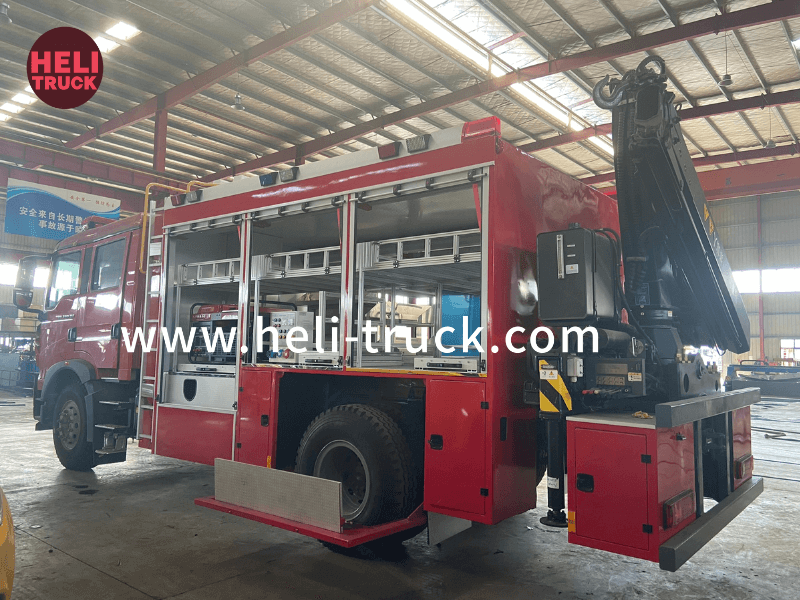Introduction:
In today's world, effective waste management is crucial for maintaining environmental sustainability and public health. One of the key components of waste management is the collection and disposal of garbage generated by households, businesses, and industries. Garbage compactor trucks play a vital role in this process by efficiently collecting and compacting waste along designated collection routes. This article explores the significance of garbage compactor trucks in waste management, their operational mechanisms, benefits, and challenges, as well as their impact on waste collection routes.
1. Importance of Waste Management:
Waste management is an essential aspect of modern society, as the global population continues to grow, leading to an increase in waste generation. Improper waste disposal can have detrimental effects on the environment, such as pollution of air, water, and soil, as well as the spread of diseases. Effective waste management practices are necessary to minimize these impacts and promote a cleaner and healthier living environment for all.
2. Role of Garbage Compactor Trucks:

Garbage compactor trucks are specialized vehicles designed to collect, transport, and compact solid waste efficiently. These trucks are equipped with compacting mechanisms that compress the collected waste, allowing for more garbage to be transported in a single trip. This not only reduces the number of trips required for waste collection but also minimizes the volume of waste, leading to cost savings and increased operational efficiency.
3. Operational Mechanisms of Garbage Compactor Trucks:
Garbage compactor trucks operate through a series of systematic processes that ensure the effective collection and disposal of waste. The trucks are equipped with hydraulically powered compactors that compress the waste into a compacted form, reducing its volume significantly. The compaction process is controlled by the operator, who monitors the level of compaction and ensures that the waste is properly contained within the truck's storage compartment.
4. Types of Garbage Compactor Trucks:
There are several types of garbage compactor trucks available, each designed for specific waste collection requirements. Rear-loading compactor trucks are commonly used for residential waste collection, as they can easily access narrow streets and alleys. Front-loading compactor trucks are suitable for commercial and industrial waste collection, as they can handle larger volumes of waste efficiently. Side-loading compactor trucks are ideal for areas with limited space, as they can collect waste from curbside bins without obstructing traffic.
5. Benefits of Garbage Compactor Trucks:
Garbage compactor trucks offer numerous benefits for waste management and collection routes. Some of the key advantages include:
- Increased Efficiency: Garbage compactor trucks can collect and compact larger volumes of waste in a single trip, reducing the number of trips required for waste collection.
- Cost Savings: By reducing the frequency of waste collection trips, garbage compactor trucks help to lower operational costs for waste management companies.
- Environmentally Friendly: The compaction of waste reduces the volume of garbage transported to landfills, minimizing the environmental impact of waste disposal.
- Improved Hygiene: Garbage compactor trucks are equipped with sealed storage compartments that prevent leakage and odors, promoting a cleaner and more hygienic waste collection process.
6. Challenges of Garbage Compactor Trucks:
Despite their many benefits, garbage compactor trucks also face certain challenges in waste collection routes. Some of the common challenges include:
- Limited Capacity: Garbage compactor trucks have a finite capacity for waste storage, which can lead to frequent unloading and reloading during waste collection routes.
- Maintenance Costs: The hydraulic systems and compacting mechanisms of garbage compactor trucks require regular maintenance to ensure optimal performance, adding to operational costs.
- Traffic Congestion: Garbage compactor trucks operating in urban areas may face challenges related to traffic congestion, which can delay waste collection schedules.
7. Impact on Waste Collection Routes:
Garbage compactor trucks have a significant impact on waste collection routes, as they help to streamline the collection process and improve overall efficiency. By compacting waste on-site, these trucks reduce the volume of waste transported to disposal sites, leading to fewer trips and lower fuel consumption. This not only benefits waste management companies in terms of cost savings but also reduces the environmental footprint of waste collection operations.
8. Future Trends in Waste Management:
As the demand for sustainable waste management solutions continues to grow, the use of advanced technologies in garbage compactor trucks is expected to increase. Innovations such as automated collection systems, real-time route optimization, and waste monitoring sensors are being integrated into garbage compactor trucks to enhance their efficiency and environmental performance. These developments are poised to revolutionize the waste management industry and pave the way for a more sustainable future.
Conclusion:
Garbage compactor trucks play a vital role in waste management by efficiently collecting, transporting, and compacting solid waste along designated collection routes. visit website specialized vehicles offer numerous benefits, including increased operational efficiency, cost savings, and environmental sustainability. While garbage compactor trucks face certain challenges in waste collection routes, their overall impact on waste management is positive and essential for maintaining clean and healthy living environments. As technology continues to advance, the future of waste management is bright, with innovative solutions and sustainable practices driving the industry forward.
